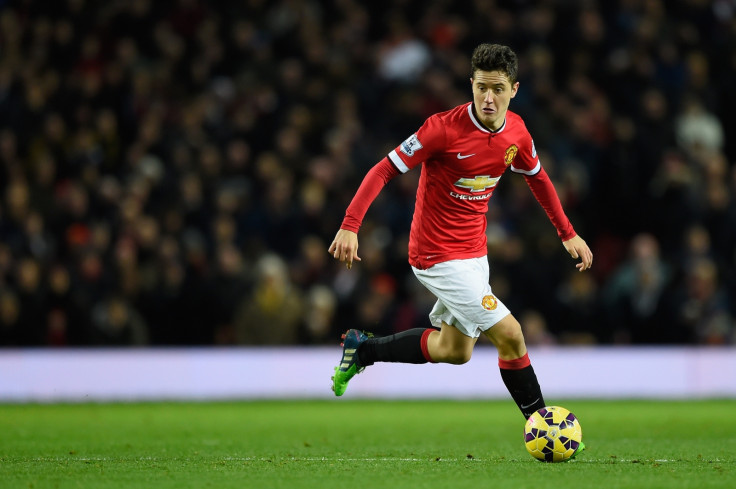Ander Herrera match-fixing: Inside story on claims that could ruin Manchester United star

Spanish football experts have told IBTimes UK how Manchester United summer signing Ander Herrera could be affected after the midfielder was named in an alleged case of match-fixing in La Liga.
Anti-corruption prosecutor Alejandro Luzon put in a criminal complaint on Monday 15 December, against Real Zaragoza and 41 more people, including Herrera.
The game under investigation took place on the final day of the 2010-11 season, when Herrera's then-side Zaragoza beat Levante 2-1 to avoid relegation – while Deportivo La Coruña went down instead.
Swansea winger and Arsenal loanee Wellington Silva are also named, as both played in the match for Levante.
Luzon alleged the Levante players were paid a total of €965,000 in cash by Zaragoza to deliberately lose the game.
According to the prosecutor, Zaragoza's financial director Francisco Javier Porquera paid 11 members of the Zaragoza squad the money. The players withdrew it in cash from their accounts to give back to the club president, who then passed the money to Levante.
This way Zaragoza avoided any suspicion, having avoided paying the money to Levante directly.
Herrera is the only player involved in the case to plead his innocence, through a statement released on his Facebook page on Tuesday 16 December.
According to Spanish regulations, Herrera and the rest of those named in the complaint now face the possibility of six months to four years in prison, a playing ban of between one and six years and a fine of up to €5.5m.
But how far can this go? Does Herrera really face being banned from football?
IBTimes UK has spoken to the journalists covering the proceedings for AS and Marca, the two biggest sports newspapers in Spain, to clarify the situation.
AS reporter Alfredo Matilla, who has had access to the prosecutor's complaint, says: "Firstly, we have to consider the presumption of innocence of the players and that they are not charged yet, but just named by the prosecutor."
However Matilla explains that "Herrera is especially involved in the case" as the prosecutor has bank statements that prove he was one of the 11 players who received around €90,000 from Zaragoza in two different transactions, withdrawing the money from his account just afterwards.
Marca reporter Sergio Fernandez adds: "Herrera is actually one of the people who have most difficulty defending themselves because the prosecutor has evidence that he - and 10 others - received the money and just took it the day after.
"Besides a criminal penalty, for the fixing, he also has to explain where the money come from in order to avoid tax fraud questions."
Herrera is expected to be required for a future trial, which will probably take place in February.
What could happen to the United midfielder then? Matilla says: "If after an investigation they find the players guilty, none will go to jail because they don't have a criminal background. But they could face heavy fines and a lengthy football suspension.
"The Spanish courts are now operating with zero tolerance, especially with important personalities. Maybe they want to set an example with this because this is the first time that they have real proof of the fixing."
Fernandez adds: "Marca have consulted several judicial sources and we understand they are not going to jail in any event, but a football ban is likely. But if they have decided to go to court it is because they have good evidence."
Nevertheless, both AS and Marca reporters believe there will not be a final decision from the court for months, even years.
Matilla said: "I'm no expert but it could even extend to two years. Forty-one people have to declare and it requires very laborious research. For Ander Herrera the case is especially complicated because even if the process is delayed, he is very young.
"Furthermore some clubs [I don't know about United] have an internal regulation for issues like fixing and gambling. If Manchester United have such a regulation, they may also impose sanctions on Herrera, which could range from financial punishment to simply breaking his contract."
Fernandez speaks in similar terms: "It could take two years or longer until the final decision. This means that for veteran players like Gabi [the Atletico Madrid captain] the potential ban is not going to affect them at all, because they will probably be retired by then. But for Herrera it is a real problem."
What could save the players? Matilla says: "It is allegedly known that Zaragoza paid the money and that the players took it from their accounts, but the club says that was just a bonus. Furthermore it looks like there are, as yet, no bank records or evidence that the Levante players received the money."
Fernandez adds: "The Zaragoza president is said to have a paper where it says the money was a bonus for the players, but let's see what the prosecutor and the judge say. The anti-corruption prosecution must now prove that, after those days, some Levante players made some extraordinary purchases."
© Copyright IBTimes 2025. All rights reserved.






















